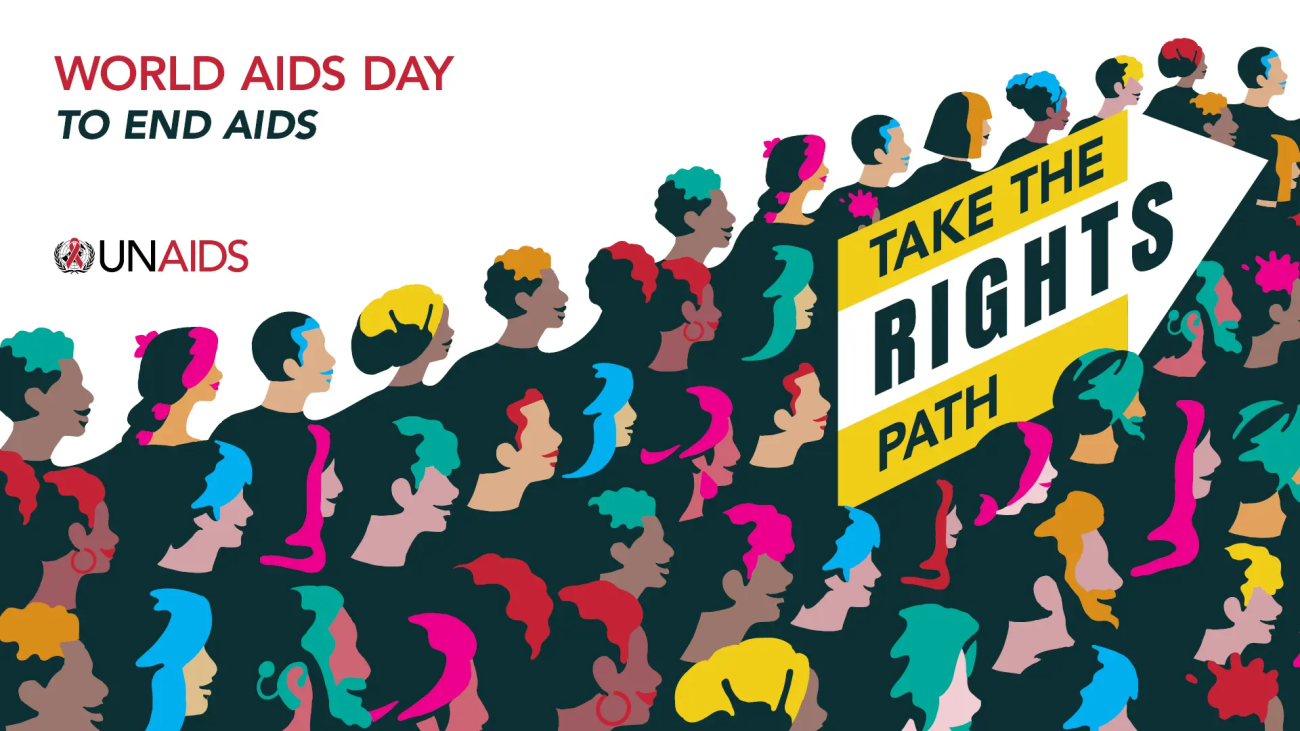On 1 December, the world commemorates World AIDS Day, reflecting on the progress made in responding to the HIV epidemic and recommitting to the journey ahead. This year’s theme, “Take the Rights Path,” underscores the indispensable role of human rights in achieving disease elimination nationally and the global goal of ending AIDS as a public health threat by 2030. For Guyana, this theme holds particular significance as the country confronts a rise in new HIV infections, which disproportionately affects key populations and young people.
The Current Landscape of Guyana's HIV Response
Guyana has made considerable progress since the first reported case of AIDS in Guyana in 1987, and today the country continues to invest strategically in the achievement of 95-95-95 targets, that is, the ambition to ensure that 95% of all persons living with HIV know their status, 95% of persons who know their status are on treatment and 95% on treatment are virally suppressed.
At the end of last year, Guyana recorded results of 94% - 72% - 87% against these benchmarks, (National AIDS Programme 2023 Annual Report). According to the 2024 Global AIDS Monitoring (GAM) Report, about 7,000 of the estimated 10,000 people in Guyana who live with HIV already access free HIV treatment that is provided by the Government. National authorities have also taken steps to provide Pre-Exposure Prophylaxis (PrEP) to key populations and improve coverage of social protection measures for persons living with HIV who are eligible for social assistance.
In this broader context of investment and advancement, Guyana is facing up to a concerning rise in new infections, highlighting the urgent need for sustained and targeted action.
According to the 2024 GAM Report, new infections have increased by 19% in the period since 2010. HIV prevalence is 1.5% among the general population while high HIV rates persist among gay men and other men who have sex with men (7.7%), transgender persons (11.1%), and sex workers (2.2%) as reported in the 2021 Bio Behavioural Social Survey (BBSS). Hence, the HIV epidemic in Guyana is mixed in characterization, with marginalized key populations being disproportionately affected, further amplifying the challenges faced by these groups.
Adolescents and young people, aged 15-24 years, are particularly affected: these demographics accounted for 14% of the 580 new infections recorded in 2023 (UNAIDS HIV Spectrum Estimates 2023).
Over the past decade, HIV prevalence in this age group has increased slightly, from 0.2% to 0.3%. Young women have become more vulnerable, with incidence rates rising by 12% since 2010 Global AIDS Monitoring (GAM) Report 2024.
Late diagnosis of people living with HIV is a real concern because advanced HIV disease contributes significantly to preventable AIDS-related deaths and exacerbates the health and economic burden on families and the healthcare system.
To reverse the trend in new HIV cases, it is critical to break down these systemic barriers and ensure equitable access to prevention, testing, and treatment services, with a focus on the human rights and the needs of the most vulnerable populations.
Removing Barriers and Prioritizing Human Rights
Human rights are fundamental to the health and well-being of every individual. They are central to ending AIDS as a public health threat, and their full realization is an essential element of human dignity. The universality, indivisibility, interdependence, and interrelatedness of human rights are critical to achieving our collective development goals.
Ending HIV in Guyana, therefore, demands a rights-centered approach. That means taking another close look at laws that have real-world discriminatory effects, including those that make same sex relationships a crime. It means scrutinizing laws that inadequately protect the interests of key populations or are insufficient to combat stigma. It means stopping the breaches of confidentiality that deter persons living with HIV from seeking care, and the social judgement that accompanies such breaches.
The ongoing Stigma Index 2.0 survey will provide good data on the experiences of people living with HIV and key populations on the impact of stigma and discrimination on their ability to access services. Empowering community-led organizations is vital as they can be effective in creating safe spaces for vulnerable groups. This can only happen with sustained funding and partnerships to scale up their impact.
To end the HIV epidemic trajectory, we call on lawmakers to once again review all laws that have discriminatory effects and limit access to HIV and broader health services. We further call for renewed efforts to reduce stigma through targeted training for healthcare providers, to address self-stigma at the household and community level and implement mechanisms to document and address rights violations.
Investing in community-based interventions to scale up services across the regions, at the primary healthcare level, especially for Pre-exposure Prophylaxis via the innovative “Lash Bags” or sex baggies which contains self-testing kits, PrEP, condoms and lubricants will be critical.
Additionally, educational information provided during outreach services by healthcare workers or community workers; expanding access to combination prevention tools and leveraging digital platforms for outreach are essential steps and are equally important. Strategic prioritization of human rights across health and social sectors, meaningful and greater involvement and empowerment of communities living with or affected by HIV and civil society, and most importantly continuous commitment of the Government to sustainable financing of the HIV response from domestic resources will be key to ending AIDS as a public health threat by 2030.
The United Nations commends the Ministry of Health for its exemplary leadership in forging strategic partnerships with civil society and development actors to address the public health challenge of HIV. Through this collaborative effort, Guyana is poised to regain control over the epidemic and ensure a sustainable HIV response for the future.
A Call to Action
On this World AIDS Day, the United Nations urge policymakers, civil society, and communities in Guyana to embrace bold and decisive actions:
- Dismantle Barriers: Repeal discriminatory laws and policies, while strengthening protections that reduce stigma and ensure equitable access to services. Address stigma and discrimination by integrating human rights and patients’ rights awareness into healthcare worker training and institutional policies.
- Prioritize Prevention: Scale up access to comprehensive prevention tools, including PrEP, HIV self-testing, and peer-led education, with a focus on key populations and young people. Expand digital platforms for virtual outreach and HIV self-testing to reach hidden populations.
- Empower Communities: Support CSOs to lead the HIV response, ensuring their expertise and reach are leveraged to address the epidemic’s root causes. Support peer-led interventions and community-based outreach to increase uptake of testing and prevention services and to respond to violations of rights and to seek restorative justice.
- Ensure Sustainability: Invest in domestic funding mechanisms to secure the gains made and build resilience against future challenges. Explore innovative financing mechanisms, including public-private partnerships, to ensure the long-term sustainability of HIV programs.
As stated by the UN Secretary General, Antonio Guterres, "Ending AIDS as a public health threat by 2030 is achievable. But reaching this goal requires breaking down the barriers keeping people from vital services." Guyana’s leadership in financing its HIV response and addressing the needs of vulnerable populations reflects a commitment to achieving Sustainable Development Goal 3: ensuring health and well-being for all. However, the rise in new infections among young people and key populations highlights the need for urgent, rights-based interventions.
By taking the rights path, Guyana can achieve an AIDS-free future—one where health, dignity, and equality are not privileges, but universal rights for every citizen.
..............................................................
This story was first published to the website of UN Guyana.





